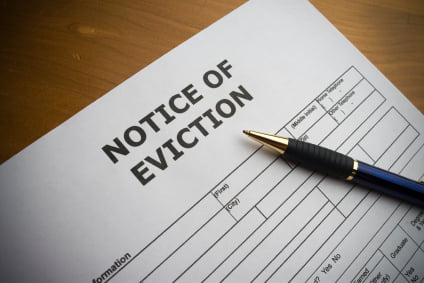OBF adherence to an existing lease
Consider an OBF who plans to operate the property he bought at a trustee’s sale as income-producing property (or resells it to an investor who will hold it as income producing property) and a residential tenant is in possession who was in possession at the time of the trustee’s sale.
If the tenant holds a lease agreement which terminates prior to the running of a 90 day notice to vacate, the OBF may serve the tenant with a 90-day notice to vacate to terminate his right to possession. If the tenant does not vacate upon expiration of the 90-day notice, the OBF may have the tenant removed through a UD action. [Pub L 111-22 §702 (a)(1);
However, if the term remaining on the existing lease terminates on a date beyond 90 days after service of the 90-notice to vacate, the OBF must allow the tenant to remain on the property until the lease is terminated by expiration or on a default, unless resold to a buyer who will occupy the property as his primary residence. A lease with a term exceeding 90 days at the time of the notice is likely an 18 or 24-month lease, as a one-year lease entered into before an NOD is filed would likely expire on or about the time the entire trustee’s sale process is completed and the 90-day notice is served and expired. [Pub L 111-22 §702 (a)(2)(A)]
Additionally, if the lease is subject to the Section 8 voucher program and was entered into prior to the trustee’s sale, the OBF must honor the Section 8 voucher program through the end of the lease. [Pub L 111-22 §703 (2)]
Federal rent control does not mention options held by a tenant to extend or renew a lease agreement and thus the effect of an option to remain in possession is not clarified. However, a lease agreement with an option to extend will most likely require the OBF to honor a tenant’s desire to extend his lease. An extension provision simply calls for a lengthening of the term of an existing lease, requiring no one to enter into a new lease agreement. However, if a tenant tries to exercise an option to renew, the OBF will most likely not be required to honor the renewal. The renewing of a lease requires the signing of a new lease agreement subjecting the new lease to the rule that it had to exist when the NOD was recorded. Thus, the tenant would not likely be protected under federal rent control laws as the lease he holds expires, and the separate right to a new lease is not provided for under federal rent control.
The lease expires within 90 days after notice to vacate
Consider an OBF who acquires a property subject to a residential tenant holding a lease agreement at a fair rent entered into with the prior owner before the NOD was recorded. The lease expires 45 days after the date of the trustee’s sale. On expiration of the lease agreement, the OBF demands the tenant vacate since the lease has expired. The tenant refuses, claiming the OBF must first serve him with a 90-day notice vacate to terminate his right to possession.
Can the OBF file a UD action and succeed in evicting the tenant since the tenant’s lease expired after the trustee’s sale?
No! All bona fide tenants, whether they hold a rental agreement or an expired or unexpired lease agreement are entitled to remain in possession of their residential dwelling unit for the duration of 90 days after being served a notice to vacate from the OBF, unless:
- a longer period of possession is given the tenant under an existing lease (see The OBF’s obligations under an existing lease above);
- a longer period of possession is given by a Section 8 voucher program entered into prior to the trustee’s sale; or
- a longer period of possession is given by local rent control ordinances or state law, in which cases rules for those programs and laws apply. [Pub Law 111-22 §702(a)(2)(B); Pub L 111-22 §703 (2)]
Thus, a tenant in possession at the time of the foreclosure sale may remain in possession for at least 90 days after service of a notice to vacate if their tenancy was:
- a month-to-month rental agreement;
- an expired lease agreement;
- a tenancy at will; or
- a lease agreement with a fixed term which expires before a 90-day notice to vacate from the OBF would expire. [Pub L 111-22 §702 (a)(1)(2)(B)]
The real estate agent’s role
Agents representing an OBF will encourage the OBF to consider serving residential tenants immediately upon acquiring title with 90-day notices to vacate. Regardless of the existence of a lease with a term extending beyond the 90 day notice period, it is in the OBF’s best interest to serve 90-day notices to get the time running before talking to any of the tenants — unless, of course, the OBF intends to keep them as tenants. If a long-term lease agreement is found to exist which expires after the 90 day notice would expire, the 90-day notice can be canceled, as no legal harm occurs by serving the notice to vacate.
If a tenant holds a long-term lease and wants to enforce it, the OBF’s agent can cancel the notice to vacate and enter into negotiations with the tenant to relinquish his keys to a broom-clean property, as well as his right to possession of the property, for an agreed-upon amount of money — a situation called cash-for-keys. Cash-for-keys is commonly employed by OBFs to persuade tenants to vacate earlier than their allotted 90-day notice period or the remaining longer period of occupancy under an existing lease agreement.
However, communication between tenants and the OBF’s real estate agents are not always cordial. Tenants frequently report very aggressive agent conduct, from relentless phone calls to downright lies leading tenants to believe they need to vacate or be locked out. Accusations of family ties to the prior owner are not uncommon, which if true would reduce the notice to vacate period to 3 days. [See first tuesday Form 578]
Agents need to inform their clients that property owners can never lock a tenant out of his property. A sheriff acting under court orders is the only one permitted to evict a tenant and oversee the changing of the locks, and a lockout can only occur after a UD action has been filed and a court issues a writ authorizing the sheriff to commence the lockout. [CCP §715.010]
If a tenant without a long-term lease agreement does remain in possession of the property beyond the expiration of 90 days after service on the tenant of the notice to vacate, the UD process may be commenced by filing a UD action and proceeding to trial. If the OBF prevails in the UD action, the sheriff will subsequently remove the tenant from the premises under a writ of possession issued by the court — following a five-day notice from the sheriff to vacate. [CCP §1161(3)]















OBFs ?
Does the bona fide lease executed before the recording of the NOD/foreclosure itself need to be recorded? Otherwise, any lease can be fabricated with contrived execution dates to mislead the OBF.
I want to know whether OBF has right to view the property he purchased at trustee’s Sale after recorded the deed. the fact that OBF owned the property by recorded has no right to collect rent or view the property during tenant’s 90 days stay or after 90 days is ridiculous. It is an insane law. Can OBF continue to rent or lease to existing tenants at market rate immediately after recordation of deed by OBFand honored the term of the lease they had prersented. There are many unanswered questions and congress don’t care about the landlords and investors who need to pay interests on loans, property taxes, insurance, maintenance cost, vandalism, etc. Why make the law that encourages people to abuse system? Tenants don’t want to pay rent and even utilities bills if they don’t have to. Congress should make the laws that people become honest, responsible and encourge to work, not to abuse system.
Reference a bona fide lease for an OBF who does not intend to occupy the property as primary residence, your article states “a bona fide lease agreement held by the existing tenant, entered into prior to the foreclosing lender recording of an NOD, granting the tenant the right to possession for a period running beyond a 90-day notice period.” I’ve read the federal “Protecting Tenants at Foreclosure Act” (PFTA) and do not agree with your statement that the lease must have been executed before the filing of the NOD. The law states “as of the date of such notice of foreclosure.” This clause was poorly written, and hence, is a gray area and has been the subject of some debate among attorneys in the different states. But, in no case, is there an implication that a Notice of Default is construed to mean a “notice of foreclosure.” A “notice of trustee sale” would be closer to “notice of foreclosure”; but in examining the clause within the spirit and context of the act, which is to purportedly protect tenants, I, and many, believe that the “notice of foreclosure” is the notice given to the existing tenant by the new owner.